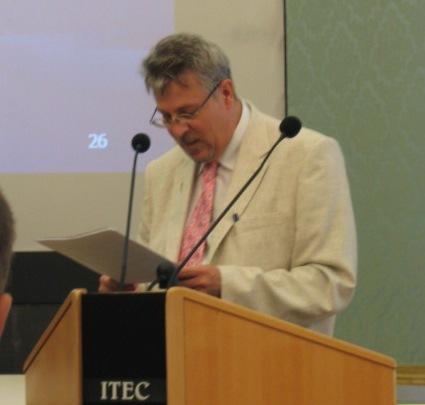A Hungarian delegation at the UIHJ seminar in Vienna (Austria), June 19, 2006
A seminar on the enforcement of the court decisions in Europe organised by the UIHJ was held on June 19, 2006 in Vienna and joined together Leo Netten, vice-president of the UIHJ as well as representatives of the Hungarian, Dutch, Belgium and German delegations
Miklos Krejniker, president of the National chamber of judicial officers of Hungary
A seminar under a heat wave
Vienna. Thirty degrees in the shade. One would give all for a light breeze. In vain. The streets are deserted in this extreme heat. It is under these conditions that one returns to the Austrian ministry of Justice in order to find new supports, in co-operation with the Dutch, Belgian and German fellow-members, who plead all for the change of the Austrian system of enforcement.
The seminar took place in the hall of honour of the Trautson Palace. One found there in addition to Power Point presentations, coffee, mineral water and fresh drinks. Were represented the Chamber of lawyers of Vienna, the ministry of Justice, the ministry of Economy and Work, magistrates of the Court of Appeal of Vienna, National insurance représentative, some members of Parliament, as well as some Austrian judicial officers, without unfortunately their president Gerhard Holzer.
The importance of an effective enforcement
The organizers and the rapporteurs however did everything to contribute to the success of this seminar. Eduard Beischall, former president of the Union of the German judicial officers, opened the conference. Leo Netten, vice-president of the UIHJ had discharged difficult work of the organisation of the meeting. He drew the attention of the public in his introductory speech to the importance of an effective enforcement with respect to human rights.
Then, Marc Schmitz, member of the Committee of the UIHJ, and his colleague, brilliantly presented to us, in a complete and detailed way, the enforcement in Holland and Belgium, which has functioned successfully for several decades.
In the second part of the seminar, Hans-Eckhard Gallo, president of the Union of the German judicial officers outlined the current situation of the execution in Germany, in full change.
Finally, Dr. Miklós Krejniker, president of the national Chamber of the judicial officers of Hungary, presented in his speech the qualitative differences between the fact of being employed by the State or to be as independent and liberal judicial officer, by also mentioning the probable difficulties (but known and controlled) which can occur at the time of a change of system.
A role on the unified European legal arena
The teams were in place, but the seminar did not seem to exert of positive impact on the participants. That is regrettable because Austria has also a role important to play on the unified European legal arena. That is all the more true as the effectiveness of the transborder execution encounters difficulties on the Austrian side. In several cases, Austrian debtors, not very inclined to pay their debts, accumulate debts with impunity abroad.
It will undoubtedly be necessary to await the end of the heat wave to continue the negotiations... in cold blood.


